Kimberley Rew is one of those British musicians who is revered among those who take the time to know the history behind their favorite pop tunes, but it would be overstating things to suggest that he is a household name, a fact which will seem particularly ironic once you have learned that he’s the composer of one of the bounciest and best-known songs to emerge during that dastardly decade known as the 1980s.
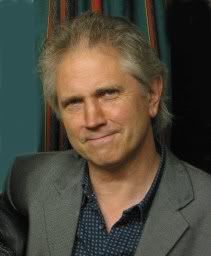
We’ll hold onto that bit of trivia for a moment, however, as we discuss some of his other credits.
Rew spent the late ’70s and early ’80s as a member of The Soft Boys, a group arguably best known for providing the world with an eccentric songwriter known for writing about fish, women, insects, and balloon men…not necessarily in that order. I speak, of course, of Robyn Hitchcock, who would go on to forge his own recording career after the dissolution of The Soft Boys. Rew did, too, with the release of a well-regarded EP entitled The Bible of Bop which found him backed by members of The dB’s, and somewhere around of the new millennium, he would finally get around to following that EP up with a full-length album (Tunnel into Summer) that subsequently led to a semi-regular schedule of solo releases. From a commercial standpoint, however, Rew’s greatest post-Soft-Boys contribution to music came when he joined forces with Alex Cooper, Vince de la Cruz, and Katrina Leskanich to form…wait for it…Katrina and the Waves.
That’s right: Kimberley Rew is the man who wrote “Walking on Sunshine.”
Tummy Tuch has just reissued the first two indie albums by Katrina and the Waves…entitled, appropriately enough, Katrina and the Waves and Katrina and the Waves 2…but, even more impressively, the label has also opted to reissue Shock Horror!, the record released by the band when they were simply called The Waves (don’t worry, Katrina’s voice still comes through loud and clear), as well as Rew’s aforementioned solo debut, The Bible of Bop. In conjunction with this return to record store shelves, Popdose was provided with the opportunity to chat with Mr. Rew via E-mail, but while we admit that we tend to prefer phoners, we were grateful to see that Rew actually took his time when composing his responses to our questions and gave us some great answers.
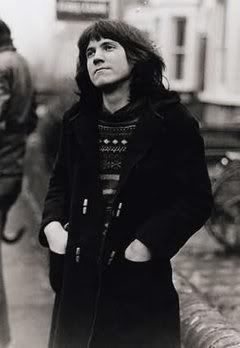
What led you into music in the first place? Do you come from a musical family, or was it an appreciation that you developed on your own?
I have a great uncle, an aunt, and a sister who are painters, so one in every generation; also, a brother who writes music for his choir in Newcastle.
Was there a particular moment of epiphany when you realized, ”This is what I want to do for a living”?
That must have been when I first heard groups with guitars on the family radio and saw them — very rarely in those days — on the TV, around age 10.
I know you weren’t an original member of the Soft Boys — indeed, you were playing in the original incarnation of the Waves when they first formed — but how did you find your way into their camp in the first place? Was the Cambridge music scene such that everyone kind of knew each other?
We knew each other quite well. In fact, at one point in 1977, we had a friendly football match…where most of the action was by ringers on both teams.
Is it true that, on the night of Alan Davies’ last gig with the Soft Boys, he played the first set and you played the second? And if it is true, whose idea was it to make the transition go down like that?
Alan Davies was taking a week’s break, so the Soft Boys asked me to deputise for, I think, two gigs…after which they invited me to join full time. I have a vague memory of Alan and myself playing one set each on one occasion. That might have been the week before Alan’s break, by way of a public rehearsal for me, at somewhere like the Alma pub in Cambridge.
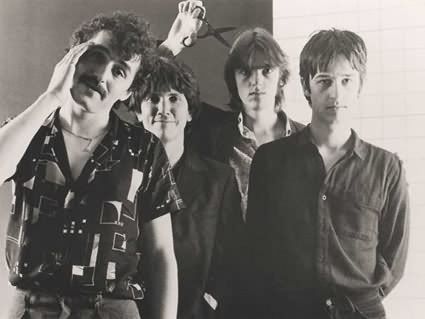
I know the universal opinion is that Underwater Moonlight is the Soft Boys’ masterpiece, but do you have any favorite songs from the Boys’ other releases that you personally think hold up just as well?
I think we hit our stride with Underwater Moonlight. One of the next songs after that we recorded was ”Only the Stones Remain,” which I like very much. Soon after, that we disbanded.
What inspired the reunion of the band in 2002? I was curious how you enjoyed the experience of doing the Nextdoorland album and wondered about your thoughts of the record serving as an epitaph for the band.
The inspiration as with everything behind the Soft Boys was, of course, Robyn’s…but I don’t think he wanted to reconvene the band to make an epitaph!
You and Robyn have worked together on a couple of his solo albums, and he has returned the favor on a couple of yours. How different is the working dynamic between you and him on those instances versus the Soft Boys albums?
When I was young, to be in a band was an all consuming passion. I suppose now it’s a matter of being older and knowing you have less raw energy but trying to use your experience of what you can do and what people like to hear in a measured way. So when Robyn invited me to the studio much later, half my mind knew that when the clock reached seven or whenever, I would then drive home to a nice cup of tea and an early night, but I knew he knew we were both older and that he knew what he was doing. You just had to look at the smiling faces in his audience.
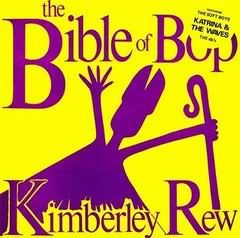
After the Soft Boys, you emerged with a solo release: Bible of Bop. I spoke to Peter Holsapple recently, and he had nothing but kind words to say about you and the experience of working on the record, but how did you hook up with the dB’s to have them work with you on that?
I was very fortunate at the time (1980-1981) to have met Peter on a unique and brief Soft Boys trip to New York, then to have inherited a recording contract after the group disbanded. This coincided with a dBs live club tour of Britain, and they were willing to spend a day with me in the studio on a friendly basis.
What was the impetus for your return to solo recording in 2000? Of your more recent albums, which do you think is the strongest?
Katrina and the Waves disbanded in 1999, which was the initial reason for my moving on to solo work. My favourite solo album is The Safest Place.
Tell me a bit about the origins of the Ridgeway EP. Did you feel that it was a creative success?
I’d always liked walking trails and would make occasional notes. By 2005, I’d made three solo albums in a row on conventional subjects (for me). As a fresh approach, I tried combining the long distance Ridgeway walk (not too far from my home in Cambridge) with some musical ideas; as well as enjoying the walk, there were fun opportunities for songs set in pubs, like ”Chain Pub” and ”Wendover,” plus atmospheric instrumentals like ”White Horse” and ”Steam Train.” They all turned out very short, which is why it’s an EP and not an LP, in which situation it’s better to crossfade them together, which is why the EP is presented as a single (free) download.
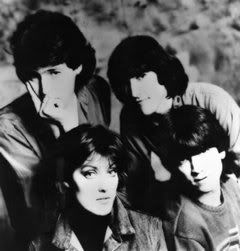
How did you and Katrina Leskanich first cross paths?
I was lucky that Alex Cooper, the drummer from the original 1976 era Waves, during the time I was a member of the original Soft Boys (1978 to 1981) had met Katrina and Vince and started a band. So when I was looking for some help with my next recording after the dBs in 1981, he was able to introduce me to a complete band.
I understand that Katrina was not originally fronting the band. What inspired the transition of lead vocals from you to her? Surely it wasn’t simply a desire for…gasp!…a more commercial sound.
I had a few original songs to record when I met Katrina, Vince and Bob, so we recorded them straight away, and I sang. At this point, the other four were looking for a songwriter and I was looking for a band, so we decided to join forces for a few live bookings I’d inherited from the Soft Boys. It slowly dawned on me that Katrina was a brilliant singer and equally slowly (over a year), I began to write sings for her to sing. I wasn’t thinking in calculated commercial terms. Honest!
Katrina and the Waves can claim that they were first big in Canada. Was it strange to first find success in the Great White North rather than in your native land?
Our pop rock guitar band style wasn’t fashionable at the time, particularly at home. Our initial record deal was short lived, then we were fortunate to get some interest from Attic Records in Canada, who had previously been the only record company to market the Soft Boys’ Underwater Moonlight (or any Soft Boys album) outside the UK. Attic did a good job of generating some college/live/radio interest in Canada, which started us on our climb from the bottom of the ladder.
How did the Bangles come to cover ”Going Down to Liverpool,” and what did you think when you first heard their version?
The Bangles heard our early version of the song on a Canadian Attic label album of ours; I imagine they picked it out by a combination of association with the Soft Boys on the same label, who were just beginning to acquire a posthumous reputation, plus the fact that there weren’t that many other new guitar band records for them to listen to at the time. Needless to say, I was delighted.
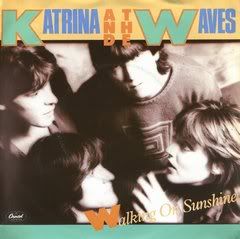
Once upon a time, I read a story about how ”Walking on Sunshine” was written when things were going less than spectacularly. Presuming that this isn’t an apocryphal tale, I was just wondering if the song was intended to be ironic when you wrote it, or if was indeed an attempt to be as cheery as possible under the circumstances.
People often ask about Katrina and the Waves’ early career, and I have to say that at that point (1982) it was taking a long time to get the band off the blocks: no record deal, few gigs, an unfashionable musical style and appearance. But that’s just the business aspect. I don’t mean everyone was miserable! My basic writing style is upbeat.
Be honest: do you sometimes wish that you could get away with leaving ”Sunshine” out of the set? I’ve no doubt that it pays the bills quite handsomely, but it’s got to have been an albatross at some point.
As Katrina says, bring on the albatrosses!
Which of the Waves’ albums do you think is the most underrated? Similarly, are there songs from lesser Waves records that you think never got a fair shake but should have?
To be honest, none of our records were ever critically ranked. There was a period of bubbling under, then a hit single- no one took any notice after that of what music was actually on the records! I don’t think we qualified as a band that merited critical interest. There are lots of likeable songs in the old catalogue. Funnily enough, Celine Dion recorded an obscure song of ours called ”That’s Just the Woman in Me” in 2007,” but it didn’t make any difference. The catalogue stayed invisible.
The band switched from Capitol over to the newly-formed SBK Records in the late ’80s. What was the overall experience like on that label?
To get signed first to Attic in 1983, then EMI in 1984/5, was a thrill and gave me a feeling of being on the way to something that I’d always wanted and which had great possibilities. After EMI (Capitol in America) and ”Walking on Sunshine,” we had the album on SBK, then in Europe one on Virgin, two on Polydor, and one on Warners. At that stage, I didn’t really feel like I was undergoing an experience where a new record company was bringing something fresh and fundamental to the band, although, of course, it was nice to record at all and be able to look forward to having a piece of vinyl in your hands. It was always much more a matter of keep writing, keep busy in the studio, keep doing good live shows, keep believing in the band from day to day.
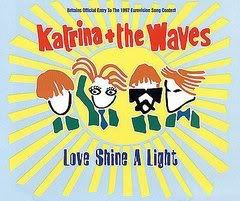
How utterly odd was it to find the band receiving a career resurgence in 97 via the Eurovision song contest?
I certainly couldn’t have predicted it. It wasn’t a branch of showbiz that I’d followed closely, but Alex, to his everlasting credit, sent in to the BBC a cassette of a demo of a spare song, ”Love Shine a Light.” That was the system in those days: the better songs would be played on BBC radio, and people would vote by phone, which is how our song came to Eurovision and ultimately won the contest. I tried subsequently to repeat the success but didn’t get as far as being selected to represent the UK. I’d say “Love Shine a Light” was the right song at the right time rather than that I’m attuned as a writer to the taste of that audience.
And, lastly, what is the status of the band in 2010? I know there has been some tension here and there over the years, but is everyone on good terms nowadays?
We are on good terms…but the band is defunct!
Katrina and the Waves may be no more, but as noted above, you can still investigate the early portion of their back catalog, along with Rew’s solo debut, via the new reissues on Tummy Tuch. To close, here’s a playlist which will provide you with an introduction to Rew’s career, including a few Soft Boys tracks, some Waves material, and his solo work, plus one of my favorite Rew / Hitchcock collaborations from a Hitchcock solo record. I believe you’ll find that every last one of these songs is positively pop-tastic, and if you agree, you’d do well to click on the accompanying links and pick up the albums in their entirety.
Kimberley Rew knows how to write a pop song…and he’s not afraid to prove it.
The Soft Boys – I Want To Be An Anglepoise Lamp (single, available on the 1976 – 1981 compilation)
The Soft Boys – I Wanna Destroy You (Underwater Moonlight)
The Soft Boys – Only the Stones Remain (single, available on the 1976 – 1981 compilation)
Kimberley Rew – Stomping All Over the World (Bible of Bop)
The Waves – Brown Eyed Son (Shock Horror!)
Katrina and the Waves – Walking On Sunshine (Katrina and the Waves)
Katrina and the Waves – The Game Of Love (Katrina and the Waves 2)
Katrina and the Waves – Is That It? (Waves)
Katrina and the Waves – That’s The Way (Break of Hearts)
Katrina and the Waves – Pet the Tiger (Pet the Tiger)
Katrina and the Waves – Honey Lamb (Edge of the Land)
Katrina and the Waves – Love Shine A Light (Walk on Water)
Robyn Hitchcock – Sally Was A Legend (Jewels for Sophia)
Kimberley Rew – Simple Pleasures (Tunnel Into Summer)
Kimberley Rew – Sick Of Hearing About Your Drugs (Great Central Revisited)
Kimberley Rew – Jerome K. Jerome (Essex Hideaway)
Kimberley Rew – The End Of Our Rainbow (The Safest Place)

![Reblog this post [with Zemanta]](http://img.zemanta.com/reblog_e.png?x-id=b9f0ed42-eb75-4d74-8660-0e5d2880a043)



Comments